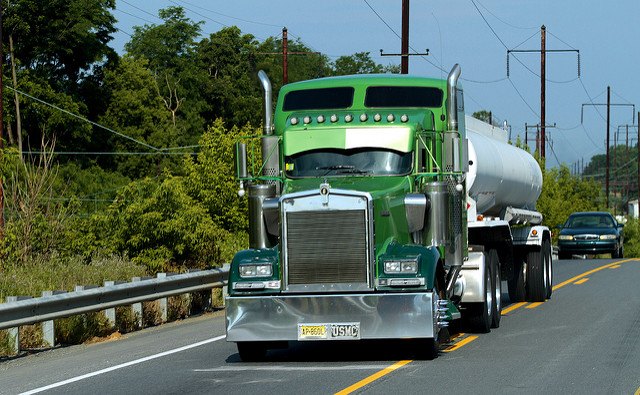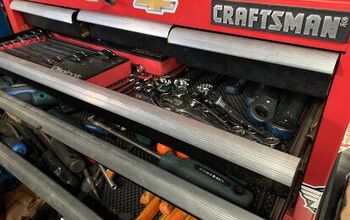Federal Government Pushes for Speed Limiters on Trucks and Buses

The U.S. Department of Transportation wants to mandate speed-limiting devices on all tractor-trailers and buses in the country in a bid to save lives and fuel.
Announced yesterday by the National Highway Traffic Safety Administration, the proposal would limit vehicles with a gross vehicle weight rating of 26,000 pounds or more to 60, 65, or 68 miles per hour. Other speed limits could be considered, but that’s up to the public to debate.
The government claims the proposed rules could save $1.1 billion in fuel costs each year, as well as reduce traffic fatalities.
“This is basic physics,” said NHTSA Administrator Mark Rosekind in a news release. “Even small increases in speed have large effects on the force of impact. Setting the speed limit on heavy vehicles makes sense for safety and the environment.”
Carriers operating commercial vehicles on U.S. interstates would be required to maintain the speed limiters for the service life of the vehicle.
The three proposed speed limits fall below that of most interstates, except for seven Northeastern states, Alaska and Hawaii. Other countries and jurisdictions have already mandated use of speed limiters, including the Canadian provinces of Ontario and Quebec, which limits heavy trucks to 105 km/h (65 mph). On Canada’s busiest highway — Highway 401, between Windsor, Ontario and the Quebec border — a common sight (and complaint) is lines of tractor trailers attempting to pass each other at nearly the same speed.
The proposal has a friend in the American Trucking Association, which petitioned the federal government to mandated speed limiters nearly a decade ago.
“Speed is a major contributor to truck accidents and by reducing speeds, we believe we can contribute to a reduction in accidents and fatalities on our highways,” said ATA president and CEO Chris Spear in a release. “As an industry, we cannot be afraid of technology, but we also must make sure that technology has proven benefits.Carriers who already voluntarily use speed limiters have found significant safety, as well as fuel efficiency and equipment lifespan benefits with little to no negative impact on productivity. We will be carefully reviewing and commenting upon today’s proposal.”
The Owner-Operator Independent Drivers Association, which represents small-business truckers, slammed the proposal, saying it would lead to more crashes and road rage.
“Highways are safest when all vehicles travel at the same relative speed,” said Todd Spencer, executive vice-president of the OOIDA, in a release. “This wisdom has always been true and has not ever changed.”
Spencer added that speed limiters would prevent truck drivers from accelerating to avoid a dangerous situation. “No technology can replace the safest thing to put in a truck, which is a well-trained driver,” he stated.
Whether you love it or hate it, the government is collecting feedback on the proposal at www.regulations.gov.
[Image: raymondclarkeimages/ Flickr]

More by Steph Willems
Latest Car Reviews
Read moreLatest Product Reviews
Read moreRecent Comments
- 3-On-The-Tree My 2009 C6 corvette in black looks great when it’s all washed and waxed but after driving down my 1.3 mile long dirt road it’s a dust magnet. I like white because dust doesn’t how up easily. Both my current 2021 Tundra and previous 2014 Ford F-150 3.5L Ecobomb are white
- Bd2 Would be sweet on a Telluride.
- Luke42 When will they release a Gladiator 4xe?I don’t care what color it is, but I do care about being able to plug it in.
- Bd2 As I have posited here numerous times; the Hyundai Pony Coupe of 1974 was the most influential sports and, later on, supercar template. This Toyota is a prime example of Hyundai's primal influence upon the design industry. Just look at the years, 1976 > 1974, so the numbers bear Hyundai out and this Toyota is the copy.
- MaintenanceCosts Two of my four cars currently have tires that have remaining tread life but 2017 date codes. Time for a tire-stravaganza pretty soon.


































Comments
Join the conversation
You should see how truckers behave on I-95/Rt 128 near Boston between I-93 and I-90 in the early morning hours around 6am. Many of them are doing 70 to 75 in a 55. If a car in the rightmost two lanes isn't moving fast enough, they tailgate them. I've even seen them zig zagging through traffic as if they were driving a car. Last Wednesday, I even saw one of these idiots lock up the wheels on the trailer trying to avoid rear-ending a car.
"Other countries and jurisdictions have already mandated use of speed limiters, including the Canadian provinces of Ontario and Quebec, which limits heavy trucks to 105 km/h (65 mph). On Canada’s busiest highway — Highway 401, between Windsor, Ontario and the Quebec border — a common sight (and complaint) is lines of tractor trailers attempting to pass each other at nearly the same speed." I've seen this in Iowa, and would like to tell you that this stinks on ice. It completely ruins highway driving. Do you want to deliberately cause more "road rage"? This is how you do it.